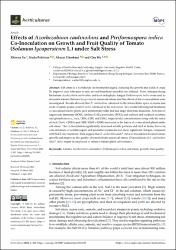Effects of azorhizobium caulinodans and piriformospora indica co-inoculation on growth and fruit quality of Tomato (Solanum lycopersicum L.) under salt stress
Citation
Xu, Z.W., Pehlivan, N., Ghorbani, A. & Wu, C. (2022). Effects of Azorhizobium caulinodans and Piriformospora indica Co-Inoculation on Growth and Fruit Quality of Tomato (Solanum lycopersicum L.) under Salt Stress. Horticulture, 8(4), 302. https://doi.org/10.3390/horticulturae8040302Abstract
Salt stress is a worldwide environmental signal, reducing the growth and yield of crops. To improve crop tolerance to salt, several beneficial microbes are utilized. Here, nitrogen-fixing bacterium Azorhizobium caulinodans and root endophytic fungus Piriformospora indica were used to inoculate tomato (Solanum lycopersicum) under salt stress, and the effects of the co-inoculation were investigated. Results showed that A. caulinodans colonized in the intercellular space in stems and roots of tomato plants, while P. indica colonized in the root cortex. Two weeks following salt treatment, co-inoculated tomato plants grew substantially taller and had larger stem base diameters. Activities of superoxide dismutase (SOD), catalase (CAT), peroxidase (POD), and reduced and oxidized ascorbate and glutathione (i.e., AsA, DHA, GSH, and GSSG, respectively) concentrations along with the ratios of AsA/(AsA + DHA) and GSH/(GSH + GSSG) increased in the leaves of co-inoculated plants under salt stress. The co-inoculation significantly increased soluble proteins and AsA in fruits; however, concentrations of soluble sugars and proanthocyanins did not show significant changes, compared with NaCl only treatment. Data suggest that A. caulinodans and P. indica co-inoculation boosted tomato growth and improved the quality of tomato fruits under salt stress. O-inoculation of A. caulinodans and P. indica might be employed to enhance tomato plant salt tolerance.


















